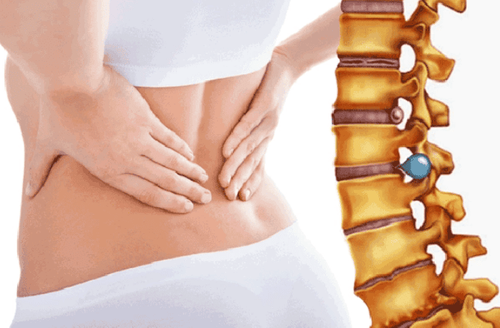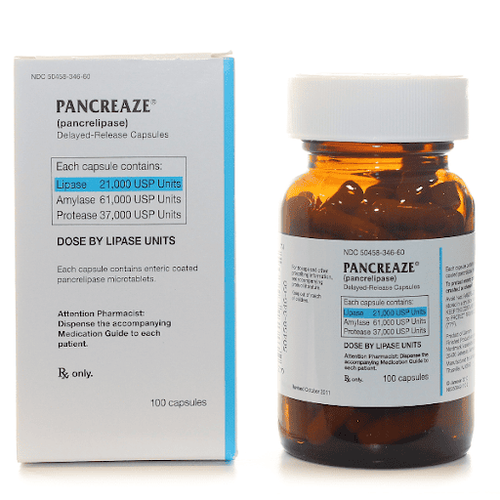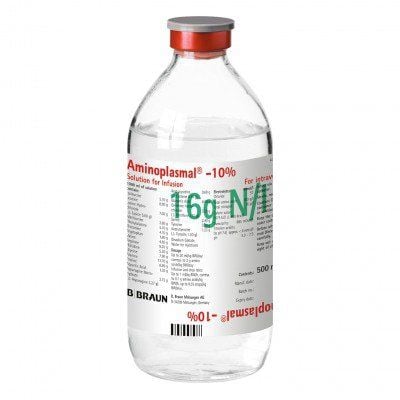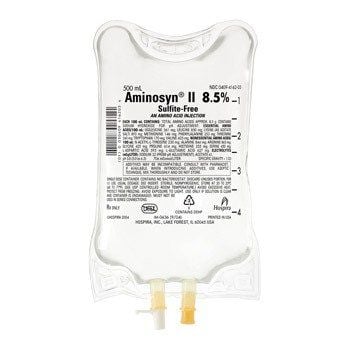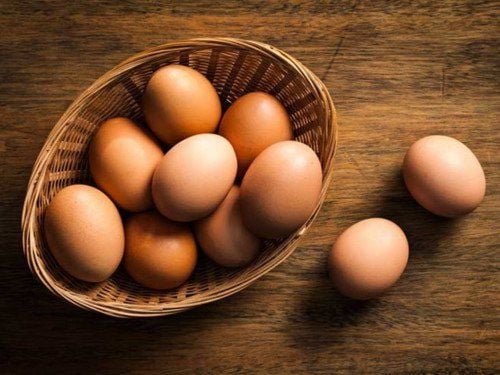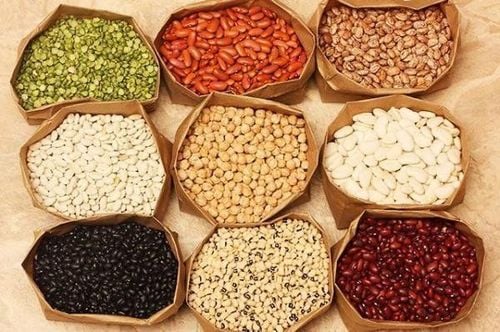This is an automatically translated article.
After surgery for disc herniation, patients may face the risk of complications such as infection, recurrence, spinal degeneration, nerve damage,... A scientific diet plays an important role in the rehabilitation process after surgery for herniated disc and spine.
1. What to eat after surgery for herniated disc and spine?
What to eat after spine surgery, disc surgery? This is a common question asked by many patients and their family members. Diet plays a very important role in the recovery process of patients after surgery. In order to build a balanced and healthy meal for patients after surgery for herniated disc, it is important to note the following foods:
1.1 Protein-rich foods Protein is one of the important components that form a healthy diet. cells of the body. They play a role in promoting the formation of new tissues (muscle, bone) and shortening the healing time of the incision. Therefore, patients after surgery for herniated disc and spine should eat protein-rich foods, especially healthy and easily digestible protein groups such as beans, fish, eggs, mushrooms, milk,...
Patients should note that red meat should be limited, because it contains a lot of saturated fat and has a high concentration of uric acid, which increases the body's inflammatory response and causes more joint pain.
1.2 Foods with high calcium and phosphorus content Calcium and phosphorus are 2 essential minerals, ensuring the maintenance of bone density. It is necessary to ensure a balanced ratio between these two minerals when supplementing the body after surgery for herniated discs and spine. The reason is that if you provide too much phosphorus, it will upset the balance, causing the body to mobilize calcium from the bones into the blood to regulate and thereby reduce the amount of calcium in the bones. Foods that patients should add to their daily diet include: Milk, dairy products, green leafy vegetables, shellfish, bok choy, radishes, cabbage, broccoli, seeds cashew, bone broth,...
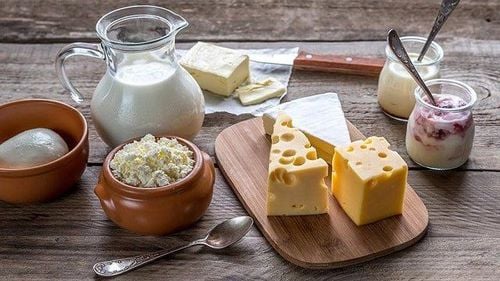
Sữa, chế phẩm từ sữa rất tốt cho người bệnh sau mổ thoát vị đĩa đệm, cột sống
1.3 Vitamin-rich foods Foods rich in vitamin B group supplements for patients with disc herniation surgery are as follows:
B vitamins: Rich in whole grains, mushrooms, avocados, lean meat, broccoli green,... Vitamins B9, B12 participate in hematopoiesis, vitamin B1 improves blood circulation, vitamin B2 strengthens immunity, brings nutrients and anti-inflammatory factors to wound regeneration. Not only that, B vitamins also help reduce nerve pain so that patients feel more comfortable and comfortable after surgery; Vitamin C: Has a very good antioxidant effect and increases resistance, supports healing of injuries in joints and discs, enhances the flexibility of the ligament system. In addition, vitamin C also increases the absorption of iron - an important component in the hematopoietic process, helping to quickly heal the incision. Foods rich in vitamin C that patients with disc herniation surgery should add to their diet are oranges, tangerines, lemons, guava, bell peppers, strawberries, broccoli, sweet potatoes, kiwi,...; Vitamin D: Supports the body's metabolism and absorption of phosphorus and calcium. Vitamin D is found in fish, shrimp, eggs, mushrooms, beef liver, whole grains,...; Vitamin K: Plays a role in supporting the synthesis of proteins for the body. Vitamin K is abundant in animal liver, pork, asparagus, dairy products,...; Vitamin E: Strengthens the immune system and reduces pain and inflammation. Vitamin E is abundant in papaya, carrots, olive oil, tomatoes,... 1.4 Foods containing Glucosamine and chondroitin Glucosamine and chondroitin are two compounds that have the effect of stimulating mucus production, making fibrous capsular, at the same time inhibiting enzymes that cause cartilage degeneration and enhancing the elasticity and mobility of the spine. Patients after spinal surgery, disc herniation should eat foods rich in glucosamine and chondroitin such as peanuts, almonds, bone broth, animal cartilage, fish,...
1.5 Other food groups Foods rich in Omega - 3: Omega - 3 have the ability to stimulate the body to synthesize collagen to restore damage, increase the strength of the disc capsule. Patients after surgery for herniated disc should eat foods rich in Omega-3 such as salmon, walnuts, pumpkin, cauliflower,...; Foods rich in fiber: Fiber helps the digestive system work stably, control weight and reduce pressure on the spine. At the same time, fiber supplements help prevent constipation caused by sedentary surgery after surgery. Fiber is abundant in fresh vegetables and fruits; Foods rich in magnesium: Magnesium is a mineral that helps maintain calcium density in the bones, thereby strengthening the bone structure. Patients after surgery for herniated disc should eat a lot of yogurt, legumes, green leafy vegetables, avocado, ... to supplement magnesium for the body.
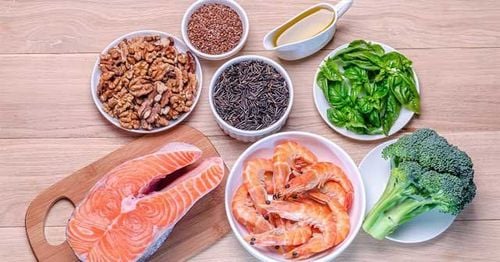
Một số loại thực phẩm giàu Omega - 3 tốt cho người bệnh sau mổ
2. What should not eat after spine surgery, discs?
In addition to the foods that should be eaten, patients after surgery for disc herniation should abstain from the following food groups:
Foods containing fructose and purines: These are two substances that increase the inflammatory response and make the pain more intense. . Therefore, patients should avoid foods containing fructose and purines such as animal organs, pickles, herring,...; Foods rich in Omega-6: If a herniated disc patient adds too many of these foods, it will cause the body to retain water, hindering the blood circulation in the body; Hot, spicy, too salty or too sweet foods: This group of foods can interfere with calcium and mineral absorption, increase inflammation and make pain more intense; Fatty foods: This type of food reduces calcium density in the bones and increases the risk of osteoporosis; Alcohol, stimulants: This group of drinks reduces the body's absorption of calcium and other important minerals, leading to bones not being supplemented with calcium. Besides, alcohol, beer, coffee, tobacco,... also cause unstable psychological states in the patient, cause blood vessels to erratically expand, making the incision take a long time to heal; Other foods: To reduce inflammation at the incision site, patients should abstain from fermented, canned, frozen, sticky foods (sticky rice, banh chung), eggs, seafood, red meat), plastic vegetables (water spinach) , sweet potatoes). After surgery for herniated discs and spine, the patient needs a special care regimen with an appropriate nutritional menu for the incision to heal quickly and recover mobility soon. In addition to nutrition, exercise after herniated disc surgery is also very important. Therefore, after performing surgery for herniated disc, the patient needs to have a follow-up examination according to the doctor's appointment or periodic health check-up, combined with rehabilitation exercises to improve the disease status effectively. However, for a quick health check-up and recovery process, patients should choose reputable medical facilities with modern facilities and a team of experienced professionals.
Currently, Vinmec International General Hospital owns a team of doctors specialized in Rehabilitation with many years of experience and dedication to patients. Besides, Vinmec also has subdivisions such as: medical examination area, physical therapy area, movement therapy area, ... all of which are spaciously designed, equipped with many modern equipment, bringing a sense of comfort. comfort for the patient to get the best treatment results. At the same time, the Department of Rehabilitation is also equipped with a system of therapeutic machinery from leading countries in technology such as the Netherlands, Japan, etc., which will bring satisfaction to customers to use. Vinmec's services.
Please dial HOTLINE for more information or register for an appointment HERE. Download MyVinmec app to make appointments faster and to manage your bookings easily.




